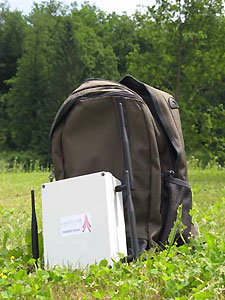Recent Stories
- Businesses urged to tap into science and technology young talent
- Digital relay baton enables remote crowd cheering of athletes
- Health Innovation Campus moves a step closer
- £7.1 million R&D boost for North West businesses
- Centre of excellence created for the next industrial revolution
- Artificial intelligence toolkit spots new child sexual abuse media online
- Strategic partnership set to help plug cyber security skills gap
- What your choice of smartphone says about you
- InfoLabTree: Discover the Story
- novi.digital Launch Event - 'An Event to Help Businesses Grow Online'
RSS Feeds
RSS feeds can deliver the latest InfoLab21 news and events direct to your browser without you having to visit the website.
In most browsers you can click on an RSS link and choose to subscribe to the feed to add it to your favourites or bookmarks.
Mountain Rescuers put 'Smart' Kit to the Test
Story supplied by LU Press Office
 backpack routers
backpack routers
Mountain rescuers have been trying out prototype kit developed at Lancaster University to help them keep in touch on life-saving missions in remote areas.
Researchers from the Computing Department have developed smartphone software that can track the progress of a rescue mission. Once a casualty is found, the smartphones can also transmit vital medical information, such as heartbeat, temperature readings and images of injuries, to medics on-scene or in hospital.
Because many rescue missions are in mountainous regions without Internet coverage, the researchers have also created a backpack which enables rescuers to create their own WiFi network wherever they go.
Once a temporary WiFi network with satellite uplinks is established at the mission base, the backpack routers extend this coverage into the field. These backpack routers are compact, lightweight and fitted with special software which automatically keeps the rescue workers in contact with each other and with their mission coordinator.
The kit was put to the test by mountain rescuers in Ig, Slovenia and is expected to be used in rescue exercises in the Lake District this summer.
The research is part of u2010, an EU- funded project to find ICT solutions for emergency and crisis situations. (For more information on the u2010 project, see www.u2010.eu).
The Mountain Rescue Association of Slovenia (GRZS), who used the kit on exercise this summer, said it could make a real difference to the effectiveness of search and rescue missions.
GRZS Instructor Mr Darko Bernik said: "When we started this work in 2006, this is what I hoped for. We are now planning how to deploy this type of technology in the future. Some of the things we've seen here could be useful to us straight away."
Computing researcher Dr Martin Dunmore, based in the University's ICT centre of excellence InfoLab21 said: "Research into viable ICT solutions for emergency and crisis situations is vital to improve the effectiveness of search and rescue operations in areas where little or no ICT infrastructure exists.
Providing communications and mission-critical information in a rapid, ad-hoc fashion speeds up mission planning and management - potentially saving lives.
The Slovenia exercise was a great opportunity to test the equipment in the field. We now plan to hone the performance of the systems and software using mountain rescue in the Lake District as our testbed."
Dr Chris Edwards, also based in InfoLab21, said: "The funding has enabled us to forge research relationships between Infolab21 and a number of organisations across Europe, and we are now pleased to be able to demonstrate the practical deployment of the hardware and software developed over the last 3 years."
Thu 02 July 2009



